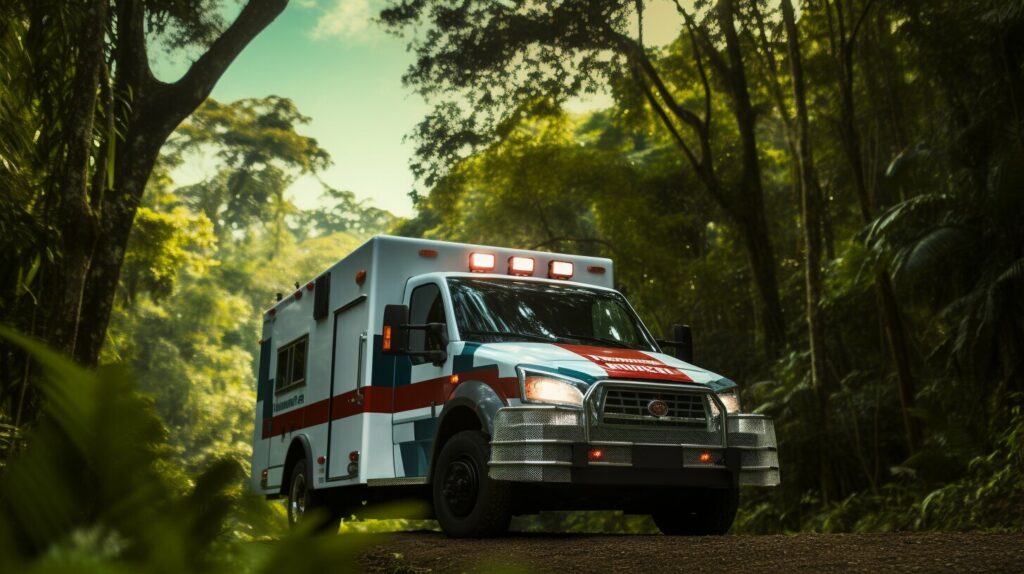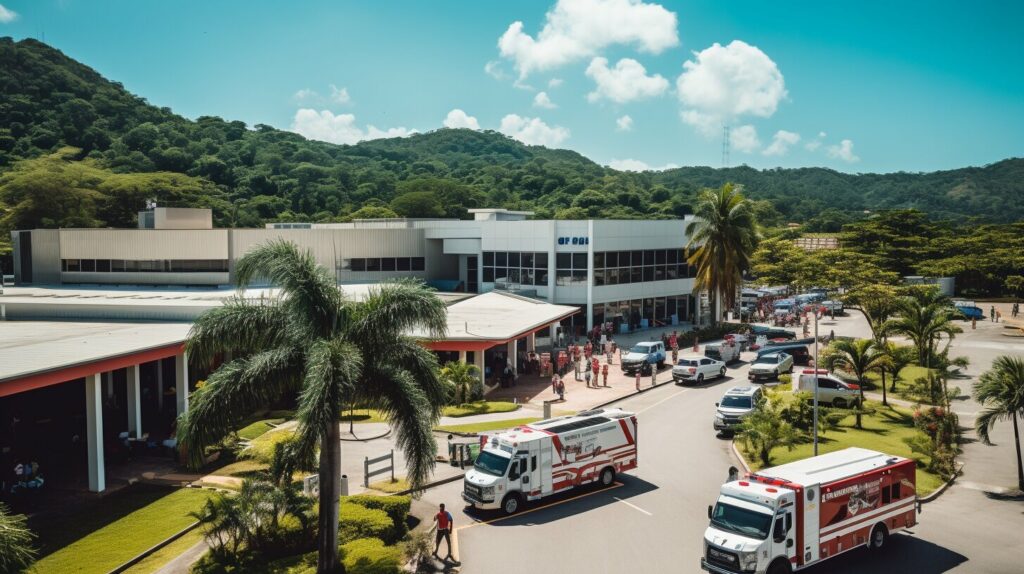At the forefront of property financing in Costa Rica, GapInvestments.com stands as a beacon for…

Essential Guide to Emergency Services in Costa Rica
Emergency services in Costa Rica play a crucial role in ensuring the safety and well-being of the country’s residents and visitors. These services are vital for immediate response and assistance during times of emergencies, providing necessary medical care, police support, and rescue operations. Whether you are a local resident or a tourist exploring this beautiful country, it is essential to be aware of the available emergency services and their contact details.
- Emergency services in Costa Rica are crucial for the safety and well-being of residents and visitors.
- The emergency hotline number in Costa Rica is 911, which covers medical and mental health emergencies.
- Public and private hospitals in Costa Rica provide emergency medical treatment, with private hospitals offering better facilities at a higher cost.
- It is recommended to have insurance coverage to ensure access to quality emergency medical care.
- Other emergency contact numbers in Costa Rica include the police department (117), fire brigades and rescue teams (118), rural police (127), and the Red Cross (128).
Being prepared, informed, and having access to emergency response teams is essential for the safety and well-being of individuals in Costa Rica. Whether it is a medical emergency, a crime incident, or a natural disaster, knowing the right numbers to call and understanding the available services can make a significant difference in the outcome of such situations.
Accessing Emergency Services in Costa Rica
When faced with an emergency in Costa Rica, it is essential to know how to access the necessary services promptly. The emergency hotline number is 911, which covers medical and mental health emergencies. It is important to remember this number and keep it accessible at all times. By dialing 911, individuals can reach the appropriate emergency response teams and receive the assistance they need.
In addition to the general emergency hotline, there are other important contact numbers that individuals should be aware of:
- Police Department: Dial 117 to reach the police department in case of emergencies related to crime or public safety.
- Fire Brigades and Rescue Teams: In the event of a fire or a need for immediate rescue assistance, individuals can dial 118. Fire brigades and rescue teams are trained to handle different types of emergencies.
- Rural Police: If you are in a rural area and require emergency assistance, dial 127 to reach the rural police. They are equipped to handle emergencies in remote locations.
- Red Cross: For medical emergencies that require immediate attention, dial 128 to reach the Red Cross. They provide emergency medical services and can assist with transportation to hospitals, if necessary.
Having access to these emergency response teams is crucial for the safety and well-being of individuals in Costa Rica. It is important to remain calm and provide accurate information when contacting emergency services. Remember to stay on the line until instructed otherwise and follow the guidance provided by the emergency professionals.
Insurance Coverage and Preparedness
While emergency services are available in Costa Rica, it is recommended to have insurance coverage to ensure that medical expenses and emergency transportation are taken care of in case of an unforeseen event. Private hospitals in Costa Rica generally offer better facilities but at a higher cost. Therefore, having insurance coverage can help alleviate financial burdens during emergency situations.
Being prepared and informed can also contribute to one’s safety in Costa Rica. It is advisable to familiarize oneself with the local emergency response procedures and the nearest medical facilities. Consider keeping a list of important contact numbers, including the emergency hotline and the nearest hospitals, in a readily accessible location. Additionally, taking basic first aid and CPR courses can equip individuals with valuable skills to provide immediate assistance before professional help arrives.
| Emergency Service | Contact Number |
|---|---|
| Emergency Hotline (Medical and Mental Health) | 911 |
| Police Department | 117 |
| Fire Brigades and Rescue Teams | 118 |
| Rural Police | 127 |
| Red Cross (Emergency Medical Services) | 128 |

Remember, timely access to emergency services can make a significant difference in emergency situations. By knowing how to contact the appropriate emergency response teams and being prepared, individuals can ensure their own safety and that of others around them.
Hospitals and Medical Care in Costa Rica
In case of a medical emergency in Costa Rica, understanding the healthcare system and available services is crucial for receiving prompt and appropriate care. The country offers both public and private hospitals that provide emergency medical treatment. Public hospitals are generally more affordable, but private hospitals often have better facilities and shorter wait times.

Hospitals in Costa Rica are well-equipped to handle emergencies and provide a wide range of medical services. They have trained professionals, advanced equipment, and modern facilities to ensure the best possible care. Some of the top hospitals in the country include CIMA Hospital, Hospital Clínica Bíblica, and Hospital La Católica.
Emergency Ambulance Services and Evacuation
When a medical emergency occurs, it is important to have access to emergency ambulance services for swift transportation to the nearest medical facility. The emergency hotline number, 911, can be dialed for immediate assistance. Ambulance services are available throughout Costa Rica and respond to medical emergencies promptly.
In cases where evacuation is necessary, Costa Rica has arrangements in place. International air ambulance services can be utilized for urgent medical evacuations to other countries if required specialized treatment not available locally. Local emergency evacuation services are also available to transport patients from remote areas to hospitals with specialized care.
Emergency Disaster Management
Costa Rica places a strong emphasis on emergency disaster management to protect its residents and visitors. The National Emergency Commission (CNE) is responsible for coordinating disaster response efforts and providing assistance during natural disasters such as earthquakes, hurricanes, and floods. They work closely with local authorities, emergency services, and international organizations to ensure a swift and effective response to emergencies.
The CNE also promotes disaster preparedness among the population through educational programs and campaigns. It is important for residents and visitors to stay informed about emergency procedures, evacuation routes, and safety guidelines to minimize the risk during natural disasters.
Conclusion
Emergency medical services in Costa Rica play a crucial role in ensuring the safety and well-being of residents and visitors. Whether it’s accessing hospitals, utilizing ambulance services, or relying on the efficient disaster management system, being prepared and informed is essential in emergency situations.
Costa Rica offers a comprehensive healthcare system, and both public and private hospitals are well equipped to handle medical emergencies. It is recommended to have insurance coverage to mitigate any financial burden that may arise from emergency medical treatments.
By understanding the healthcare system, knowing the emergency hotline number (911), and being aware of the available services, individuals can take the necessary steps to ensure prompt and appropriate care in case of a medical emergency in Costa Rica.
Conclusion
Having a comprehensive understanding of emergency services in Costa Rica is essential for ensuring safety and peace of mind during your stay in the country. By being prepared and having access to the necessary resources, you can navigate any emergency situation with confidence.
In Costa Rica, the emergency hotline number is 911, which covers medical and mental health emergencies. It is crucial to remember this number and use it in case of emergencies. Public and private hospitals are available for emergency medical treatment, with private hospitals offering better facilities, albeit at a higher cost. It is advisable to have insurance coverage to mitigate the financial burden that may arise from unexpected medical emergencies.
In addition to the emergency hotline, other important contact numbers include the police department (117), fire brigades and rescue teams (118), rural police (127), and the Red Cross (128). These organizations play a vital role in responding to various emergency situations and ensuring the safety of individuals.
Being prepared, informed, and having access to emergency response teams is of utmost importance when living or visiting Costa Rica. Familiarize yourself with the emergency services available, keep the contact numbers handy, and consider obtaining travel or medical insurance to provide comprehensive coverage during your time in the country.
FAQ
Q: What is the emergency hotline number in Costa Rica?
A: The emergency hotline number in Costa Rica is 911. This number covers medical and mental health emergencies.
Q: What other emergency contact numbers are available in Costa Rica?
A: In addition to 911, other emergency contact numbers in Costa Rica include the police department (117), fire brigades and rescue teams (118), rural police (127), and the Red Cross (128).
Q: Are there public and private hospitals for emergency medical treatment in Costa Rica?
A: Yes, both public and private hospitals provide emergency medical treatment in Costa Rica. Private hospitals generally offer better facilities but at a higher cost.
Q: Do I need insurance coverage for emergency services in Costa Rica?
A: It is recommended to have insurance coverage in Costa Rica to ensure access to emergency medical services and minimize out-of-pocket expenses.
Q: How important is being prepared and informed for emergency situations in Costa Rica?
A: Being prepared and informed is crucial for safety in Costa Rica. Having access to emergency response teams and knowing the emergency contact numbers can make a significant difference in emergency situations.


